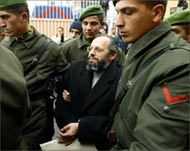Turkish cleric denies plotting attack
A Turkish cleric has denied charges that he planned to attack a gathering of the country’s top political and military leaders.

Metin Kaplan is charged in Turkey in connection with a 1998 plot to crash an aircraft into the mausoleum of Mustafa Kemal Ataturk, founder of the modern Turkish state, where the country’s political and military leadership were attending national day ceremonies.
“I reject accusations of terrorism. I am a Muslim and Islam rejects terrorism,” the cleric told the judge, quoting the Quran to back his arguments.
He said the Germany-based organisation he leads is in fact a civic group that has never resorted to violence.
“Neither me nor my friends and family have ever even caused someone’s nose to bleed,” Kaplan said.
Kaplan’s organisation, the Union of Islamic Communities – also known as Hilafet Devleti (Caliphate State, in Turkish) – aspires to set up a state in Turkey based on Islamic rules.
Banned group
The organisation, which has launched campaigns against Israel and Turkey, was banned in Germany in 2001 under legislation passed in the wake of the September 11 attacks in the United States to crack down on Islamists.
 |
|
The cleric’s court case is expected |
“Islam cannot be dissociated from politics,” Kaplan told the court. “If there is an Islamic state, you have to protect it – otherwise you have to create it.”
Kaplan’s defence lawyer Husnu Tuna said: “There is no doubt that Kaplan has adopted positions against Turkey in his speeches and writings, but he has never used violence.
“Not being a friend of Turkey is one thing – being a terrorist is another.”
Tuna said the prosecution had no evidence to back its allegations of terrorism other than “magazines and audio and video cassettes”.
Caliph of Cologne
Nicknamed the “Caliph of Cologne”, Kaplan was handed over to Turkey by Germany in October after he served four years in jail for ordering the killing of a rival religious leader.
Kaplan is also accused of plotting another attack to seize a prominent mosque in Istanbul and “fight to the death” with security forces.
His trial is expected to be lengthy. Court cases in Turkey often take years with hearings months apart.
Kaplan was extradited after months of legal wrangling. The German government only agreed to the extradition after Turkey scrapped the death penalty and introduced other human rights reforms as part of its drive to win EU entry.